The NVIDIA GeForce GTX 750 Ti and GTX 750 Review: Maxwell Makes Its Move
by Ryan Smith & Ganesh T S on February 18, 2014 9:00 AM ESTOverclocking: When Headroom Exceeds Clockspeed Limits
Last but not least we have our customary look at overclocking performance. With all 3 of our cards being based on the same reference design, we expect to see some relatively consistent results between the cards. At the same time NVIDIA has told us that GTX 750 has some very interesting overclocking properties, and boy they weren’t kidding.
On a quick note, as a GPU Boost 2.0 product, overclocking on the GTX 750 series is not any different than on other GTX 700 series cards. It’s still based on offset overclocking, with the user adjusting offsets for the final overclock. But with that said there are two things to point out. The first is that the power target is limited to 100% on all cards. Because these are sub-75W cards, NVIDIA is not allowing anyone to exceed the card’s default TDP, so you only have as much power to play with as you started with. Second of all, none of our cards had available overvoltage bins. Apparently some cards do, but ours did not, so our voltage bins maxed out at the default bins you see listed.
Finally, all 3 cards have a maximum clock offset of 135MHz. This will be an important fact in a little bit.
| GeForce GTX 750 Series Overclocking | |||||
| GTX 750 Ti (Ref) | Zotac GTX 750 Ti | Zotac GTX 750 | |||
| Shipping Core Clock | 1020MHz | 1033MHz | 1033MHz | ||
| Shipping Max Boost Clock | 1150MHz | 1175MHz | 1163MHz | ||
| Shipping Memory Clock | 5.4GHz | 5.4GHz | 5.0GHz | ||
| Shipping Max Boost Voltage | 1.168v | 1.137v | 1.187v | ||
| Overclock Core Clock | 1155MHz | 1168MHz | 1168MHz | ||
| Overclock Max Boost Clock | 1285MHz | 1310MHz | 1298MHz | ||
| Overclock Memory Clock | 6.3GHz | 6.1GHz | 6.0GHz | ||
| Overclock Max Boost Voltage | 1.168v | 1.137v | 1.187v | ||
As we can quickly see, two patterns emerge. The first is that with every card equipped with 6GHz memory (though we remain unsure which mode the Zotac GTX 750’s is in), each and every card hits at least 6GHz, and sometimes a bit more. With the 128-bit memory bus generally providing the biggest bottleneck for GM107, the fact that there is 12%+ overclocking headroom here is going to be very helpful in feeding the tiny beast that is GM107.
More significantly however is the core overclock. We maxed out every single one. Every card, from the NVIDIA reference card to the Zotac cards, had no trouble overclocking by the full 135MHz to their respective maximum overclocks. The Zotac GTX 750 Ti, having the highest maximum boost clock by default, is technically the winner here at 1310MHz. But at this point everyone is a winner. Going by the maximum boost clock, every card is capable of an 11% core overclock, to go with that tasty 12% memory overclock.
The fact of the matter is that this is not something we normally encounter. Sub-75W cards are not poor overclockers, but they’re not usually strong overclockers either, which is why a 135MHz offset limit makes sense at first glance. But it’s clear that NVIDIA underestimated their own overclocking potential here when setting the specifications for these cards, as there’s seeming some headroom left untapped. Without additional offset room it’s impossible to say just how much more overclocking headroom remains – it may not be very much – but there should be room for at least some additional overclocking.
At this point with cards already in the pipeline we’ll have to take a look at individual cards and see what manufacturers have set their offset limits at. If they have followed NVIDIA’s specifications, then they’ll be equally limited. But hopefully with the launch now behind them, NVIDIA’s partners can work with NVIDIA on making greater offsets available on newer batches of cards.
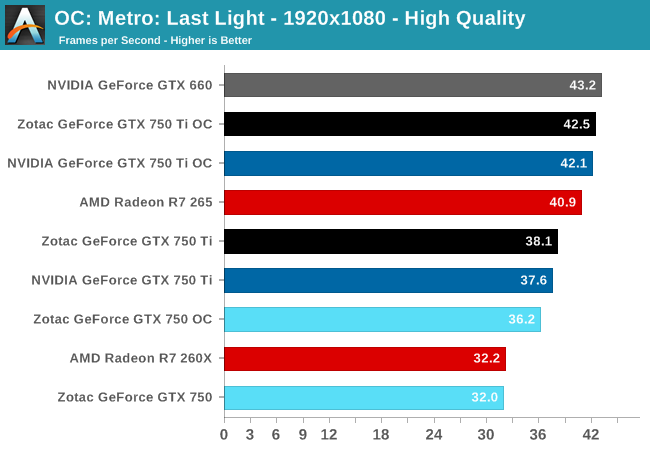
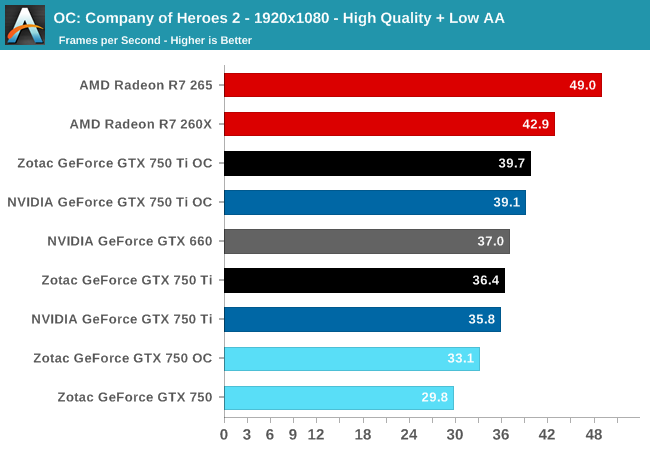
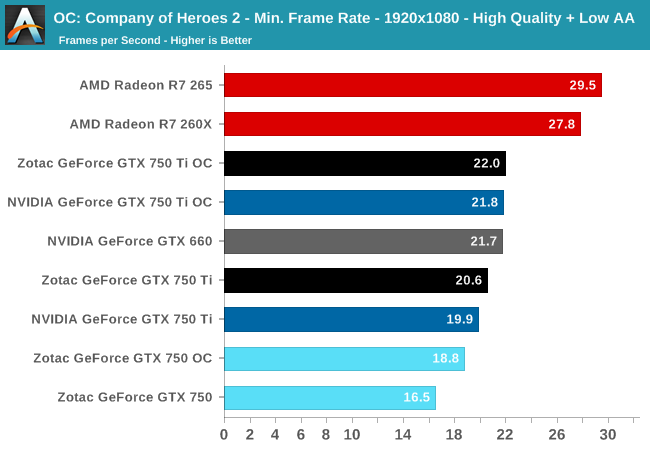
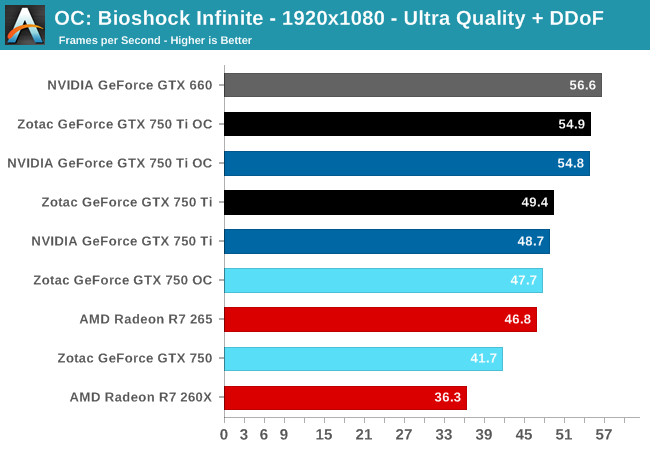
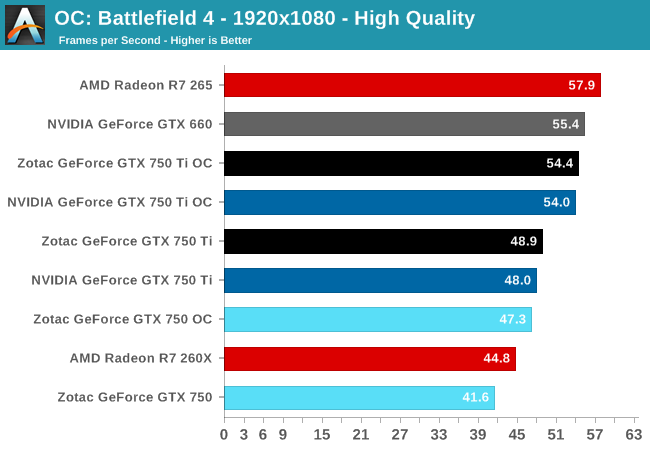
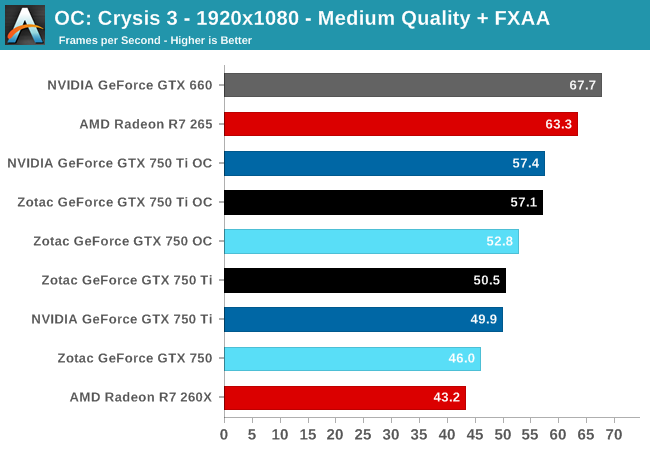
Depending on the game being used, the benefits from overclocking range from 9% to 12%, roughly in-line with our overclocks. For the GTX 750 this is sometimes enough to catch the stock clocked R7 260X, but even with this overclock the GTX 750 Ti will still generally trail the R7 265.
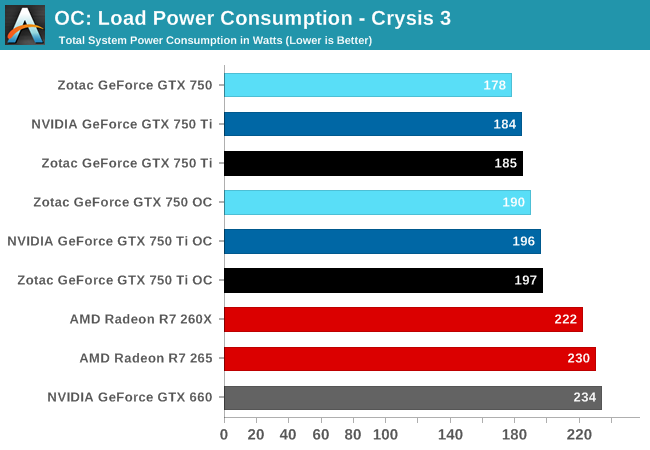
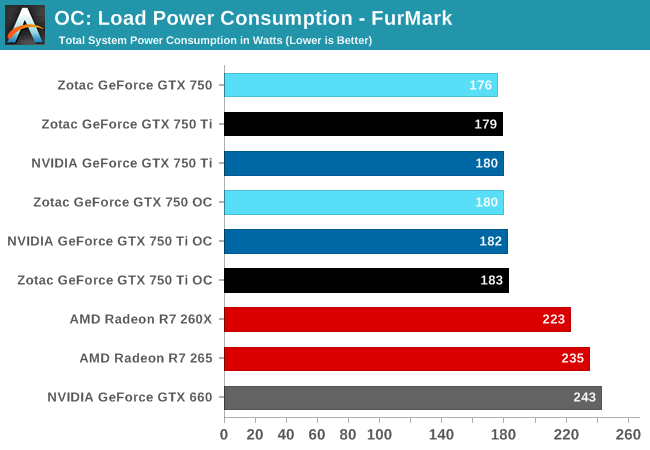
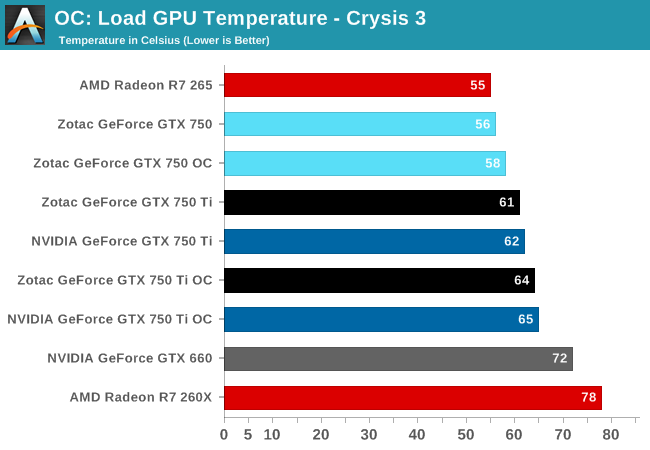
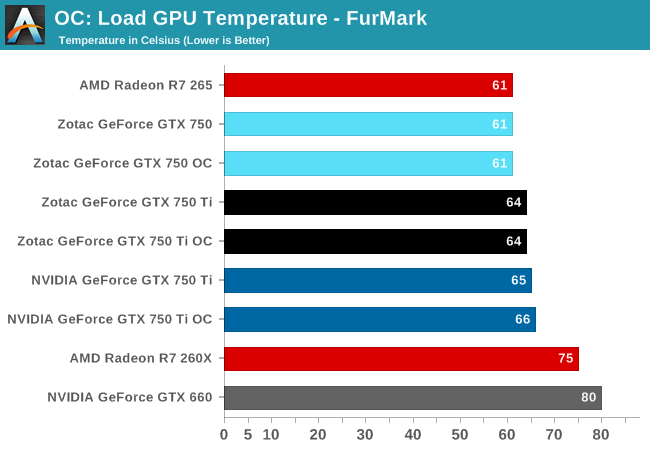
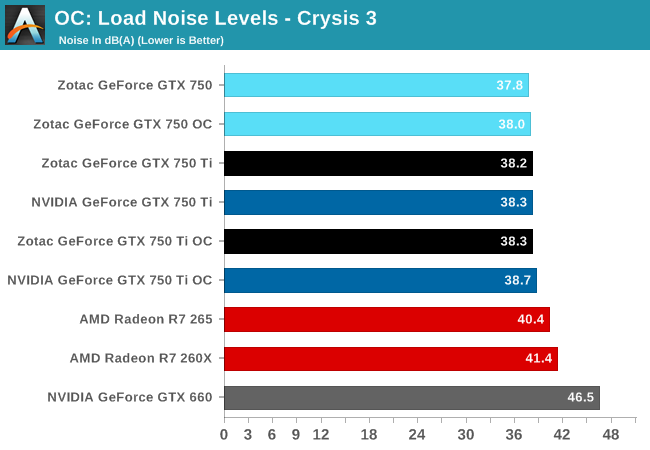
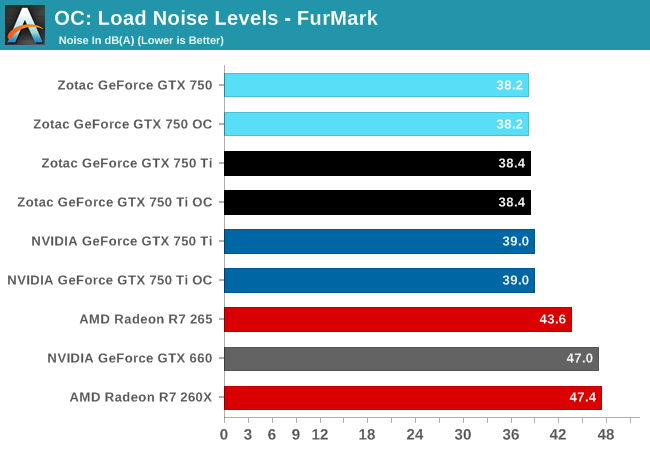
On the other hand, because of the hard TDP limit of 100%, this extra performance is relatively cheap. Video card power consumption moves by only a few watts, and then a few watts of CPU time on top of that. For all practical purposes overclocking can extend NVIDIA’s already incredible performance-per-watt ratio by another 10% with no meaningful impact on noise. Given the consistency of overclocking headroom we’ve seen in our GTX 750 series samples, this is one of those scenarios where overclocking is going to be a reasonable and (relatively) fool proof action to take.










177 Comments
View All Comments
rish95 - Wednesday, February 19, 2014 - link
Yes. You can run PCIe 3.0 cards on 2.0 slots.rish95 - Wednesday, February 19, 2014 - link
This card is quite literally jesus for me. I've been waiting for something like this for a few years now.Currently I'm running an Athlon II X4 with a GT 240 on an OEM 250W PSU. I know it sounds like that may be a bit much for the PSU, but it's been working fine for years.
There haven't been any cards without external power connectors released since the GT 240 that have been significantly faster. I know I could have jumped to an HD 7750, but it's still not that much of an improvement. Now I can get a massive 3-4X performance boost without upgrading my PSU.
I hope this was worth the wait. I've had a copy of Crysis 3 for some time that I couldn't use because the 240 doesn't support DX11.
cbrownx88 - Wednesday, February 19, 2014 - link
Good for you man! This does sound like quite the fit! Hope your power supply keeps hangin in there!Antronman - Wednesday, February 19, 2014 - link
These cards will barely be able to run Crysis 3.rish95 - Wednesday, February 19, 2014 - link
Did you even read the review? It seems to manage 36 FPS at high settings at 1080p.I don't need Very High and I don't need 60 FPS. I just need it to look pretty good and run at a playable frame rate at native res.
This does seem to fit the bill.
Qwertilot - Thursday, February 20, 2014 - link
The only worry in some ways is that the 20nm version of this is inevitably going to be non trivially better at the same sort of power draw. I guess it isn't at all certain if they'll do a roughly equivalent one now though. Obviously not terribly soon. Might end up skipping to 16nm or something.HighTech4US - Wednesday, February 19, 2014 - link
Quote: NVIDIA is making a major effort to target GTX 550 Ti and GTS 450 owners as those cards turn 3-4 years old, with the GTX 750 series able to easily double their performance while reducing power consumption.And they have gotten me to upgrade my HTPC GPU that was on an EVGA GTS 450 to a brand new EVGA 02G-P4-3753-KR GeForce GTX 750 Ti Superclocked 2GB which I just purchased on Newegg for $160.38.
http://www.newegg.com/Product/Product.aspx?Item=N8...
This card is factory overclocked at Core Clock: 1176MHz Boost Clock: 1255MHz has a DisplayPort connector and a better copper heat assisted heat sink and fan shroud that exits some of the heat out the back bracket.
I will be selling my old EVGA GTS 450 on eBay and should clear $60 so I will have a very nice card for the next 3-4 years for an upgrade price of around $100. Not bad at all.
pierrot - Wednesday, February 19, 2014 - link
Awesome this ITX friendly size is the standard, just need power nowninjaquick - Thursday, February 20, 2014 - link
As neat as this is, it only proves that Maxwell scales within its TDP. It is consistent where it is at.devdollers@gmail.com - Friday, February 21, 2014 - link
wow..............